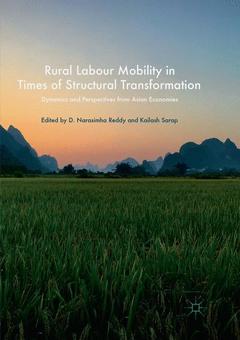Rural Labour Mobility in Times of Structural Transformation, 1st ed. 2017 Dynamics and Perspectives from Asian Economies
Coordonnateurs : Reddy D. Narasimha, Sarap Kailash

This book examines essential issues and perspectives on rural labour, helping readers understand the changes that are currently taking place in the labour markets, especially with regard to migrants from rural to urban areas, their socio-economic conditions, factors contributing to such mobility and associated problems. Further, it addresses the question of why the socio-economic conditions of rural labour have not experienced measurable improvements.
Presenting a collection of painstakingly researched essays that focus on both India and China, the book addresses these challenges with an explicit focus on safeguarding the interests of rural labour under the neoliberal dispensation. The research is based on primary survey data and analytical issues from selected Asian economies, especially from India. On the basis of the findings discussed, it subsequently suggests ways forward so as to improve the wellbeing of migrant households and put an end todistress migration. Lastly, the book convincingly argues that improving labour market outcomes, and more specifically, generating employment and providing alternative livelihood avenues, represents the most pressing challenge in rural areas.
Introduction: Rural Labour Dynamics and Mobility in Times of Deepening Structural Transformation.- Part I: Structural Transformation and Labour Dynamics.- Chapter 1. Structural Transformation and Alternative Pathways to the Lewis Turning Point.- Chapter 2. Labour and Employment in the Emerging Rural-Urban Continuum in India: Towards a Cohesive Policy.- Chapter 3 Chinese Land Institutions: Peasant Workers, Industrialization and Urbanisation.- Chapter 4. Politics of Scale: The Shift from Small Migrant Farmers to Big Organisational Agriculture in Shanghai Suburb.- Chapter 5. Craft Clusters and Work in Rural India: An Exploration.- Chapter 6. Casualization and Shift of Rural Workers to Non-farm Activities.- Chapter 7. Expanding Livelihood Strategies for Marginalised Communities in Rural India: Options, Challenges and Future Direction.- Part II: Rural - Urban Labour Mobility.- Chapter 8. The Changing Nature of Rurality: Reframing the Discourse on Migration and Commuting.- Chapter 9. Out-migration from Hill Region of Uttarakhand: Magnitude, Challenges and Policy Options.- Chapter 10. Migration as a Coping Strategy for Climatic Stress: A Study of Drought Affected Areas of Odisha.- Chapter 11. Migration and Development: Rural to Urban Temporary Migration in Gujarat.- Chapter 12. The Life and Times of Migrant Workers in Chennai.- Chapter 13. The Uncivil and De-Institutionalising Labour Relations of Accumulation Through Disuse: The Case of Brick Kiln Industry in Telangana.
D. Narasimha Reddy, a noted development economist, was professor of economics and Dean, School of Social Sciences, University of Hyderabad, India, where he taught for over two decades. He was Professor, S.R. Sankaran Chair (Rural Labour), during 2012-14 and also ICSSR National Fellow, Council for Social Development, Hyderabad, India. His areas of specialization are globalization, WTO and agrarian crisis. His latest publication includes Agrarian Crisis in India. He was a member of the Farmers' Welfare Commission set up by Andhra Pradesh Government to look into the issues of farmers' suicides and agriculture crisis.
Date de parution : 12-2018
Ouvrage de 356 p.
14.8x21 cm
Date de parution : 11-2017
Ouvrage de 356 p.
14.8x21 cm



